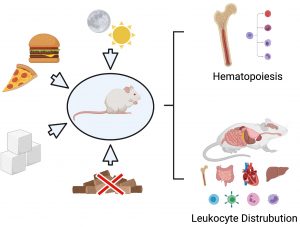Irregular eating patterns are partly responsible for rising indices of cardiovascular disease, such as hypertension, obesity, diabetes, and atherosclerosis. There is a growing awareness that, in addition to what we eat, it is also important when we eat: food can affect circadian rhythms and can either harmonize or disrupt homeostasis. In some instances, timing of our meals may even contribute to inflammation.

Although lifestyle interventions such as intermittent fasting have gained in popularity as remedies for a variety of ailments, the consequences of these interventions on physiology remain only partially understood. Our work focuses on the impact that different metabolic challenges have on leukocyte production and function, which are known to critically influence cardiovascular health and disease.
